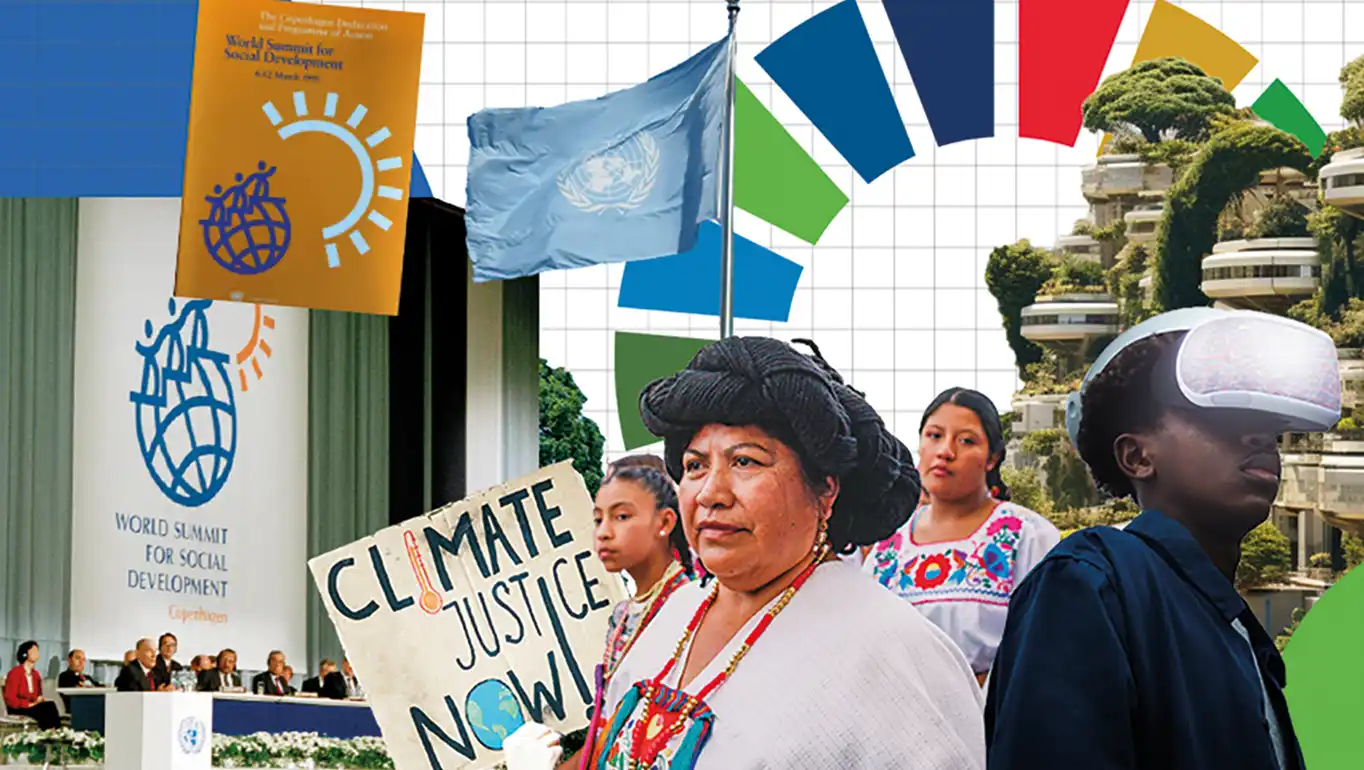As the 2030 Agenda nears its final stretch, the world faces overlapping economic, social, political, and ecological crises that threaten fragile social progress, with post-pandemic recovery stalled. Between 2019 and 2022, 25 million more people fell into poverty, totalling 712 million (9% of the global population, UN SDG Report 2024), while wealth concentrates among the top 1% and gender inequalities persist whilst emerging technologies like AI risk deepening exclusion.
Against this backdrop, key global events in 2025—the Fourth International Conference on Financing for Development (FfD4) in Seville, the Second World Summit for Social Development (WSSD2) in Doha, and COP30 in Belém—offer a unique opportunity to rethink social and sustainable development, and the financing frameworks required for transformative change. In this complex landscape, UNRISD’s research plays a pivotal role, ensuring that policies are evidence-based, justice and human rights-informed, responsive to the needs of the most vulnerable, and able to bridge global goals with local realities.
Financing a just future
Addressing today’s social challenges requires adequate financing. At FfD4 in Seville, UNRISD highlighted the need for fair fiscal pacts, universal social protection, gender-responsive policies, and social and solidarity economy initiatives.
While progress has been made on inclusion, governance and accountability, gaps remain in debt reform, while systemic inequalities in the international financial architecture persist. Insights from FfD4 feed into WSSD2 in Doha, helping ensure inclusive, evidence-based discussions that link financing to social development and guide transformative policies to reduce inequalities and support sustainable development.
From Copenhagen to Doha
The first World Summit for Social Development (1995) delivered an action program for poverty eradication, full employment and decent work, and social integration. UNRISD played a central role in Copenhagen and the 2000 Geneva follow-up, producing the reports States of Disarray and Visible Hands, supporting the start of the “social turn” in development agendas.
Decades later, financial constraints and residualist approaches still limit the remit of social policy. WSSD2 offers a pivotal moment to rethink social development, review progress after 30 years, and reaffirm commitments made in Copenhagen. As in 1995, UNRISD is actively engaged in the lead-up to WSSD2, bringing in global South perspectives and alternative voices to ensure the Summit is inclusive, participatory, and actionable, and that its agreements translate into transformative policies supported by effective monitoring and follow-up.
Advancing UNRISD’s research agenda in an era of uncertainty
As the world faces uncertainty, polarization, and accelerating crises, UNRISD’s research agenda continues to evolve to address structural drivers of inequality and injustice. The current polycrisis shows that existing social development models are failing: too many are left out, and too few hold power. A new vision is needed—one integrating social, economic, and environmental objectives on an equal footing. UNRISD proposes new eco-social contracts as a solution, linking human well-being with environmental sustainability, democratic participation, human rights, and social justice.
Building on this vision, UNRISD is mapping emerging trends to identify key research priorities for 2026–2030. These include the erosion of democracy and multilateralism, driven by populism, political and corporate capture, democratic backsliding and human rights erosion. Rising inequalities, power asymmetries and social exclusion demand renewed attention to transformative social policy, including universal social protection, progressive taxation, and gender-responsive budgeting. UNRISD also explores just transitions, connecting climate action with social justice through feminist and care-based approaches, and emphasizes the care economy as central to equality and sustainability.
Future research will further explore life-centered and solidarity-based economies, post-growth and circular economies, responses to gender and LGBTQIA+ backlash and proposals for rights-based migration policies, advancing intersectionality and cultural change. Looking towards and beyond 2030, UNRISD seeks to accelerate SDG implementation, address policy and financing gaps, and address future challenges of digitalization and AI, including misinformation and manipulation of public trust. Youth, feminist, and civil society movements remain key drivers of transformative change, advancing gender justice, democracy, and sustainability worldwide.
The post-2030 agenda
Economic growth without fair distribution does not serve people; climate policies without equity will lose public support; and social development that is not underpinned by fair fiscal contracts is unsustainable.
UNRISD bridges research and policy, offering perspectives that challenge conventional approaches and point to transformative solutions. Our mission is to put people and the planet at the center of development, remaining committed to critical inquiry, innovation, and shaping ideas that will define a post-2030 future that is inclusive, equitable, and sustainable.



